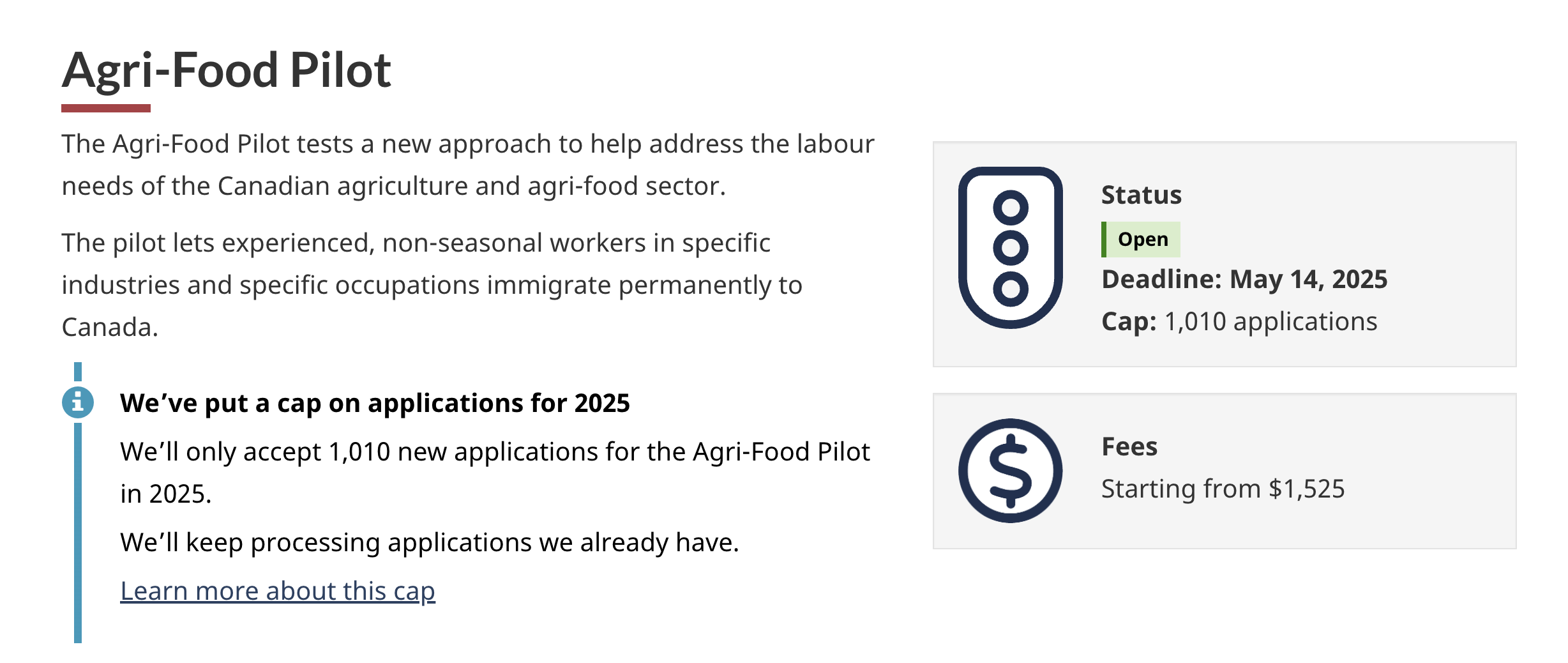Recently, Immigration, Refugees and Citizenship Canada (IRCC) announced new quota restrictions for the Agri-Food Pilot program. Effective immediately, the program’s 2025 application cap has been reduced to 1,010 from the previous annual limit of 2,750. This change is intended to manage the program’s growing demand while aligning with the government’s immigration objectives.

Overview of the Agri-Food Immigration Pilot Program
Since its launch in 2020, the Agri-Food Pilot program has provided a pathway to permanent residency for foreign workers in specific non-seasonal roles in the agriculture and agri-food industries. Eligible sectors include:
- Meat product manufacturing;
- Greenhouse, nursery, and floriculture production (including mushroom production);
- Animal production (excluding aquaculture).
Applicants must meet the following eligibility criteria:
- A valid job offer;
- Relevant educational qualifications;
- Relevant work experience;
- Language proficiency requirements;
- Sufficient settlement funds.
Since the program’s inception, more than 4,500 agri-food workers and their families have successfully immigrated to Canada through this pathway.
Reasons Behind the Restriction
Unlike most Canadian immigration programs that require an Invitation to Apply (ITA), the Agri-Food Pilot operates on a first-come, first-served basis. Any eligible foreign national can directly apply to IRCC for permanent residency.
However, due to the rising demand, the number of eligible applicants in 2025 is expected to exceed the current capacity outlined in Canada’s immigration levels plan. To address this challenge, IRCC has decided to reduce the application cap to ensure the program’s sustainability.
The Future and Impact of the Pilot Program
Immigration pilot programs serve as pathways to Canadian permanent residency. Unlike permanent immigration streams, pilot programs run for a maximum of five years, after which they expire. Successful pilot programs can be converted into permanent immigration streams. For instance, the Atlantic Immigration Program (AIP) evolved from a successful pilot initiative.
As a pilot program, the Agri-Food Immigration Pilot is set to expire on May 14, 2025. If it is not transitioned into a permanent program by then, it will officially conclude.
The Canadian federal government often uses pilot programs to address labor shortages in specific industries. The Agri-Food Pilot was established to address long-standing labor needs in the agriculture and agri-food sectors. With the implementation of the new quota policy, a surge in applications in the coming months is expected.
Applicants Urged to Act Quickly
With the tightening of application caps, prospective applicants are encouraged to submit their materials as soon as possible to avoid missing this valuable opportunity for permanent residency. IRCC has emphasized that applications submitted after the quota is filled or after the deadline will not be processed.
Whether this program will be extended or converted into a permanent immigration stream remains to be seen. However, it has already made significant contributions to Canada’s agri-food industry by attracting critical labor resources and supporting industry growth.
Analysis and Conclusion
The adjustment of the application cap signals Canada’s move toward more refined management of its immigration policies, aiming to attract global talent while ensuring the efficient operation and balanced resource allocation of the immigration system. This change carries significant implications for the long-term development of immigration policy and the labor supply-demand dynamics in the agri-food industry.









